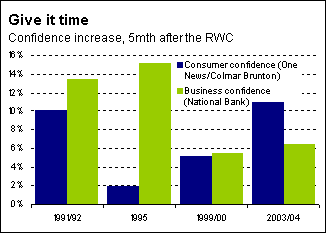Confidence evaporates in Cardiff
Confidence evaporates in Cardiff
I haven’t felt particularly enthusiastic about work this week – like much of the rest of the country, I suspect. It might be the fact that I’m running out of patience with the pitiful weather that spring has thrust upon us, with endless gales, overcast skies, and regular dumpings of rain. Or is it the thought of having to wait until 2011 before the All Blacks have another chance to get their hands on the Rugby World Cup?
Back in 1996, the National Bank conducted some analysis that successfully used All Black performances as an explanatory variable in predicting election results (along with the less novel indicators of economic growth and the length of time in government). So with the media doing their best to multiply the clouds of doom and gloom across the country since the French pulled off their shock quarter-final win, I wondered whether the All Blacks efforts have any measurable impact on the nation’s psyche.
Let’s start with the average Joe on the street. We’ve got consumer confidence data from the One News/Colmar Brunton poll and its previous incarnations stretching back to 1976. Regressing this measure of consumer confidence against the All Blacks’ monthly win ratio over the last 30 years shows no significant connection between rugby performances and people’s overall sense of economic wellbeing.
But if we factor in whether the All Blacks won or lost at the World Cup, something starts to show up. Consumer confidence can be expected to lift by around five percentage points three months after the All Blacks fail to win the cup. Maybe this represents something of a rebound in happiness once we’ve got past a two-month period of mourning.
However, there are a couple of likelier explanations for the apparent correlation between the World Cup and consumer confidence. The share market crash in late 1987 swept away any last vestiges of rugby-related euphoria generated by David Kirk’s men earlier in the year. And a surge in exports in early 1992, marking the end of a major recession in New Zealand and around the globe, was more significant for the economy than the 1991semi-final stumble. World Cup results after 1991 appear to have less effect on consumer confidence.
So what about the business community? Using business confidence from the National Bank’s Business Outlook over the last 20 years suggests that World Cup performances, as well as the All Blacks’ efforts in the intervening years, have the ability to influence business sentiment. A losing All Black team has the potential to temporarily knock down business confidence by between four and seven percentage points, with an additional hit of six percentage points if the loss sees them knocked out of the World Cup.
It seems odd that businesspeople would be more concerned about the rugby than your average consumer. Nevertheless, specific businesses and ventures have greater capacity to be influenced by the All Blacks. Petrol sales are now unlikely to be boosted by offering plastic All Black figurines. All Blacks merchandise and clothing won’t be rushing out the shop doors. And how well is Murray Deaker’s new book going to sell with the title "Henry’s All Blacks: How the 2007 Rugby World Cup was notWon"?
Some of the analysis and commentary following the quarter-final has expressed the hope that, as a nation, our reaction will be more "grown up" than the vitriolic episodes that followed the 1999 and 2003 eliminations. If it’s any indication, the data suggests that the effect of the All Blacks on confidence is less prominent now than it was 10-15 years ago. A continuation of that trend means that, when 2027 rolls around, we might barely notice there’s a World Cup being played – although English soccer fan’s obsession with 1966 would suggest otherwise.

Don’t be surprised if confidence numbers look a little soft over the next couple of months. By the time the new year rolls around, summer will have kicked in and the nation should be largely through its collective grieving process.
To be perfectly honest, anyone keeping an eye on the economy should have bigger issues to concern themselves with anyway – the possibility of further interest rate rises, for example, or a property market slump. The only people with the right to feel gloomy following the World Cup loss are the players, coaches, and management staff. After all, it’s their jobs that are now genuinely on the line.







